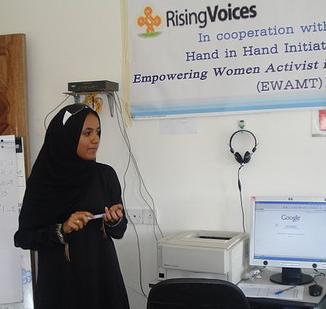It was a busy weekend for three Rising Voices grantee projects as representatives from Blogging Since Infancy, Voces Bolivianas, Abidjan Blog Camps, and HiperBarrio all spoke about their projects at major international conferences.
Voces Bolivianas
Elia Varela Serra and Eduardo Ávila speaking at the Digital Citizen Indaba
Eduardo Ávila, executive director of Voces Bolivianas, was invited to share his experiences at this year's Highway Africa conference in South Africa, the largest conference for journalists from across the African continent. Speaking with Elia Varela Serra from Maneno.org, Ávila presented Voces Bolivianas as a case study of how citizen media projects can welcome under-represented languages to online conversation by adapting open source tools and collaborating with volunteer translation networks. A re-cap of the session on the Digital Citizen Indaba blog:
Just as in most African countries Internet access in Bolivia is still concentrated in major urban centres, where people have Internet at home or at work. “This not only leaves out the rural resident and lower social economic sectors but also indigenous groups and women”, says Eduardo Avila, Executive Director of Bolivian Voices. But in addition, Eduardo argues that there has been an online resurgence of indigenous languages in Bolivia.
Ávila also participated in the roundtable discussion “Are people ready to have their own means od disseminating information within their communities?”
Abidjan Blog Camps
Nadine Tchaptchet-Kouamouo from Abidjan Blog Camps, a collective of bloggers from Ivory Coast who are holding regular workshops and events to bring new bloggers into their midst, was also at this year's Highway Africa conference where she was awarded the “Best Woman ICT Reporter” prize. Looking back on her time in Johannesburg (where she stayed longer than she had expected), Nadine writes:
I do not regret having tried the “way of life” of this great country of South Africa, whose level of development can be frustrating for us, but can also inspire us in our own development. Starting with representatives at the community level (women, children, youth, etc …) it is necessary for us to see farther, think bigger, and envision the best …
Blogging Since Infancy, Uruguay
Pablo Flores from Plan Ceibal, Uruguay's One Laptop Per Chile project, and Blogging Since Infancy presented at this year's Ars Electronica Symposium on Cloud Intelligence. Pablo asked the audience to consider how those who have the most to gain can benefit from the information amassing online. The value of intelligence, after all, is in solving problems facing society. Flores points to housing, nutrition, and education as three major social issues which can be improved with more access to better information. In order to bring intelligence and information from the cloud to everyday citizens in Uruguay, for example, they need a network of connectivity and devices.
Flores points to a class which set up a blog to interact with fellow students across the border in Brazil. Of course such pen pal projects have existed for decades, but the blogs allow the students to interact in real time and incorporate other tools to learn Portuguese and Spanish. His presentation concludes by emphasizing the importance of avoiding black boxes – technological gadgets which function properly, but don't allow us to understand how they function. Plan Ceibal values open source technologies as a way of promoting curiosity so that students are encouraged to look “inside” the programs and adapt them to their cultural needs.
Ethan Zuckerman live-blogged Pablo's presentation. Pablo's conference statement was published in the Ars Electronica 2009 Catalog.
HiperBarrio
HiperBarrio was represented at Ars Electronica by Álvaro Ramirez, Gabriel Jaime Vanegas, and Diego Gomez. Álvaro's presentation introduced the history and evolution of HiperBarrio and how the group of young bloggers and citizen journalists in San Javier La Loma have managed to maintain a sense of community while still introducing new members to remain open and inclusive. He stressed that HiperBarrio re-thinks the roles of libraries as more than just places to consume culture produced at the institutional level; but rather that they should serve as collective laboratories to produce and publish culture from the grassroots. HiperBarrio served as a model for Chile's national library network as it re-thought the role of its libraries for the digital era, and was also presented in the application by Fundación Empresas Públicas de Medellín which eventually led to a $1 million grant from the Gates Foundation. (Ramirez points out that none of the $1 million is currently budgeted for HiperBarrio or similar grassroots new media training programs.)
Álvaro referenced the story of Suso as an example of how citizen journalism is forming a process by which the young people discover more information about their own community and become invested in its future. He also pointed out media production is providing an appealing alternative to gangs and drugs for the community's young people. An article in Colombia's El Tiempo newspaper adds:
The project was presented to the public at Ars Electronica with a video which highlights the important role HiperBarrio plays to help young people find alternatives to crime, violence and drugs in a region that has been marked by the drug trafficking, guerrillas and paramilitaries.
“When people have no access to media, and are given the opportunity to tell their stories and show who there are, then they take that opportunity,” Ramirez said to the public.
Support our work
Since Rising Voices launched in 2007, we’ve supported nearly 100 underrepresented communities through training, mentoring, microgrants and connections with peer networks. Our support has helped these groups develop bottom-up approaches to using technology and the internet to meet their needs and enhance their lives.
Please consider making a donation to help us continue this work.






3 comments
Congratulations to Rising Voices projects.
Now I thing that learn is possible when you work in community. Also, write is a excellent exercise to change the world.
Best Regards from Colombia,
Cati.
Amazing. Bravo.
amazing ambassadors of freedom of speech and activism! keep it up!